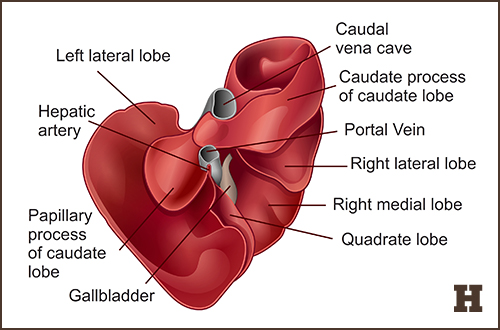Understanding and Successfully Treating Canine Liver Cancer
Many types of cancers and other diseases have been on the rise in recent years including liver cancer and liver disease in dogs, and it’s important to understand why in order help prevent and quickly treat once detected. Unfortunately, it’s hard to detect liver cancer in dogs, as symptoms often don’t arise until the late stages, so it’s imperative to take the proper action as soon as possible.
Liver Functions and It’s Importance in Cancer Treatment
The liver serves to help the body filter out and remove toxins and potentially dangerous substances. It plays a vital role in cleaning the blood to rejuvenate the immune system for optimum health. It’s role however, puts it at the front line in healing any type of cancer, as well putting it directly in harm’s way of potentially being invaded by the disease.
 Most medications are metabolized in the liver, putting excessive stress on the organ. This can hinder the liver’s ability to perform its functions optimally. If pharmaceuticals have been used, it’s critical to incorporate some holistic remedies to assist in cleansing and boosting the liver’s functions.
Most medications are metabolized in the liver, putting excessive stress on the organ. This can hinder the liver’s ability to perform its functions optimally. If pharmaceuticals have been used, it’s critical to incorporate some holistic remedies to assist in cleansing and boosting the liver’s functions.
The two types of Canine Liver Cancer (Hepatocellular Carcinoma) found in dogs:
Metastatic Liver Cancer
Metastatic liver cancer is the result of cancer spreading to the liver from another organ. The cancer usually travels to the liver through the blood stream or the lymphatic system. Most metastatic liver tumors are generally multiple nodules at the time of detection.
Primary Liver Cancer
Primary liver cancer is the result of a tumor originating in the liver. the most common primary liver tumor is the hepatocellular carcinoma which invades into the liver tissue. It’s less common and found more frequently in older dogs and prognosis is often better than Metastatic.
 With the increase of commercially processed diets with high levels of carcinogens, the liver is subjected to high levels of contaminants and we’ve seen been a rise in many liver related problems such as Liver Disease in Dogs.
With the increase of commercially processed diets with high levels of carcinogens, the liver is subjected to high levels of contaminants and we’ve seen been a rise in many liver related problems such as Liver Disease in Dogs.
Main Causes for Liver cancer in Dogs
As mentioned above, most cases of liver cancer in dogs are Metastatic liver Cancer, in which the cancer has spread from another organ or area of the body. The increase in many types of canine cancer, including Primary Liver Cancer is often attributed to a number of issues, with improper diets and exposure to carcinogens topping the list.
Carcinogens found in commercially manufactured dog foods, pesticides, herbicides, and pharmaceuticals are considered to be the main contributors to this epidemic.
Diagnosis
Often a blood profile, blood count, chemical blood profile, urinalysis and an electrolyte panel will be performed. A microscopic study of fluid taken from the liver by needle can be done to detect dysplasia (a pre-cancerous change in cells and tissues) and overt malignant features of cancerous cell spread.
Diagnostic imaging may include abdominal radiography to locate and determine if it’s a single tumor, or multiple nodular/scattered tumors. X-ray imaging of the chest may be performed as well to check for metastasis into the lungs.
Canine Liver Cancer Symptoms
The following symptoms of liver cancer in dogs are typically absent until the disease reaches an advanced stage:
- Lethargy
- Weakness
- Loss of appetite (anorexia)
- Weight loss
- Polydipsia (excessive thirst)
- Diarrhea
- Vomiting
- Hepatomegaly (enlarged, uneven liver)
- Abdominal hemorrhage
Canine’s Liver

Types of Liver Cancer Tumors
Hepatocellular carcinoma accounts for 50% of primary liver tumors found in dogs, while Hepatocellular Adenoma and Hepatoblastoma are extremely rare.
Some studies indicate that Miniature Schnauzers may be more susceptible. Dogs with nodular hepatocellular carcinoma usually show metastasis to the lymph nodes, adrenal glands, lungs, peritoneum, pancreas, kidneys, intestines, urinary tract, bladder and spleen.
Bile duct carcinomas account for approximately 35% of all malignant liver tumors in dogs. One contributing factor of bile duct carcinoma is attributed to a kind of parasite called Trematodes. This however, is not believed to be the main contributor, due to bile duct carcinoma occurring outside areas associated with Trematodes.
Labradors Retrievers are considered to be more predisposed. Bile duct carcinoma can either intrahepatic (inside the liver), extrahepatic (outside the liver) or within the gall bladder. Intrahepatic tumors are common and metastasis occurs in approximately 88% of cases. The disease often spreads to the lymph nodes, adrenal glands, lungs, pancreas, kidneys, spleen, heart, and spinal cord.
Endocrine tumors or Carcinoid can but rarely develop in dogs, with younger breeds have a higher predisposition. These tumors are aggressive and often involve multiple lobes. They also can metastasize to the regional lymph nodes, peritoneum, lungs, heart, spleen, kidneys, adrenal glands and pancreas. These tumors develop from the neurorectodermal (the region of embryonic ectoderm that develops into the brain and spinal cord as well as into the nervous tissue of the peripheral nervous system).
The most common type of hepatic sarcomas include; hemangiosarcoma, leiomyosarcoma and fibrosarcoma. The liver is the most common site of metastasis for dogs with hemangiosarcoma. In 4-6% of dogs hemangiosarcoma arises primarily in the liver. Other hepatic primary sarcomas include rhabdomyosarcoma, liposarcoma, osteosarcoma and malignant mesenchymoma. Disseminated Histiocytic Sarcoma sites include; liver, lungs, spleen, lymph nodes and bone marrow.
Conventional Treatments for Dogs with Liver Cancer
Conventional medicine has undergone some amazing advancements in recent years, however it does have it’s limitations, especially when it comes to promoting health and treating certain diseases.
Conventional approaches often deal with the tumor itself but fail to address the underlying issue. The tumor, is in fact the result of an issue, and that issue needs to be addressed in order achieve and maintain remission.
For Metastatic Liver Cancer with multiple nodules, the prognosis is extremely poor due to the fact that surgical removal of all the cancers cells is highly unlikely. Chemo and Radiation are not commonly considered viable options at this time and survival is often less than six months in these cases.
The common conventional treatment for Primary Liver Cancer in dogs is surgical removal of the portion of the liver that has been invaded by the disease. Fortunately, a large percentage of the liver can be removed while keeping it functioning and able to regenerate itself.
The outcome in these cases is dependant on a number of factors, such how invasive the tumor is, whether it’s spread to other organs and to what degree the tumor can be removed. Unfortunately, when using conventional treatments solely, prognosis is still poor due to the degree of metastasis at the time of surgery.
Holistic Treatments and Diet for Dogs with Liver Cancer
When it comes to treating a dog for an illness, it’s important to keep in mind the idea of assisting the body restore itself to health. The body has the amazing ability to heal itself, and for most illnesses it’s incredibly successful. When a serious and fatal illness such as cancer develops, there’s often the aspect of a immune system dysfunction that contributes to the issue.
The digestive tract is directly connected to the immune system and often plays a vital role in contracting an illness as well as recovering from it. This is why the proper diet is so important, as without it, the underlying cause is not addressed and the immune system’s healing power is not being fully utilized.
Even with conventional medicine and surgery, it’s the body that still needs to do the work of recovery, and assisting that process is surest way to assure the best results. Constructing a diet to support the digestive tract and holistic treatments such as powerful herbs and supplements to boost the immune system functions are vital and increase the chance of restoring health drastically.
Each case of dog cancer needs to be assessed and addressed independently. The type of cancer, the organs affected, and the unique circumstances of each dog will determine what the best options are. If conventional treatment are involved, then those have to be considered as to not conflict and cause complications. For that reason, there’s no “one” treatment that is best for all circumstances and some amount of consideration for all the different aspects is needed. That said, there are some staples and some common holistic treatments that can and should be considered in canine liver cancer diet.
A few herbs to consider to plomote healthy liver function in dogs and help cleanse contaminants are: Milk Thistle, Borotutu Bark, Dandelion Root, Chicory Root, Burdock root, Artichoke, Turmeric, Peppermint. You can find liver support products with a blend of these herbs, or can order the herbs independently from companies such as: starwest–botanicals.com
Is it a Case of Faulty Genes?
In the vast majority of cases, absolutely not. Some types of cancer are more common it certain breeds as they may be more predisposed. However, it’s important to understand that predisposed does not mean predetermined! Genetics are a factor, but there are many other factors as well.
For cancer, or any disease to develop, a dysfunction in the immune system must be present. So by addressing this area, we can greatly reduce illness regardless of what genetic challenges a certain breed has.
All that being said, when a breed is more predisposed, this simply means that when something is challenging the immune system, this is the weakest link that we often find the effects first.
Many dogs have these same “weak links” and go on to live a healthy full lives, while some unfortunately do not. Genes are merely blueprints, and it’s how well these these blueprints are properly built upon and maintained that makes the difference.
External factors such as dietary complications and toxins are a main factor in affecting the digestive tract and immune system, which are directly linked. This intern allows for the cells to be altered and cancer to develop.




